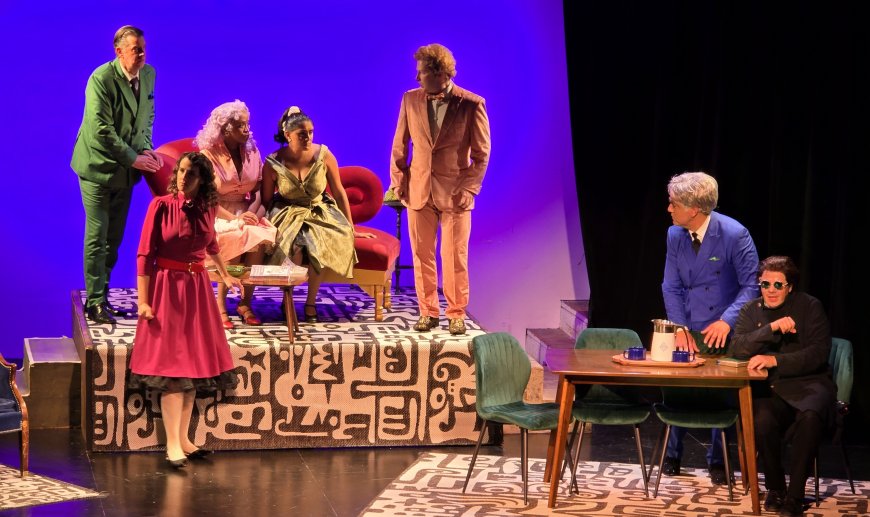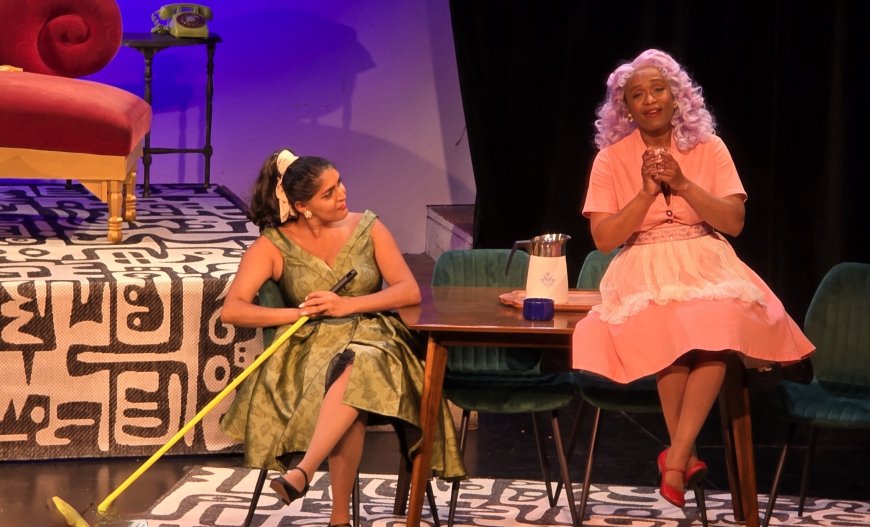
Put together a secretly libertine “holy man,” his credulous supporters, a young couple in love, a supportive brother, a protective stepmother, and a knowing maid, and you have all the ingredients for a delicious French farce.
In this case, though, these are the elements for Kirke Mechem’s hilarious 1980 opera Tartuffe, which landed at the Legion of Honor’s Gunn Theater on Sunday, June 22, as the third production in Pocket Opera’s 2025 season.
Based on Molière’s 1664 play of the same name, Mechem’s opera, his first, is a delightful whirlwind. The composer wrote his own libretto, joining an extremely select group of predecessors who have succeeded in doing so. Tartuffe is dramatically well structured, singable, and balances a minimum of pure conversation with arias, duets, and trios. It is also, importantly, very funny.

Molière subtitled his play The Hypocrite, and the opera’s title character, sung with oily charisma by the bright-toned baritone Eugene Brancoveanu, is exactly that. Tartuffe pretends to be deeply religious, if not an actual clergyman, while simultaneously trying to steal from his patron Orgon (the sonorous bass Isaiah Musik-Ayala).
Our antagonist also attempts to seduce Orgon’s long-suffering second wife, Elmire (sung with touching sincerity by mezzo-soprano Courtney Miller), and marry Orgon’s daughter, Mariane (the charming soprano Melissa Sondhi), even though she’s in love with another man. Needless to say, complications ensue.
Elmire, along with Mariane’s sly maid, Dorine (saucily adorable in the hands of coloratura soprano Shawnette Sulker), see through Tartuffe early on. They eventually conspire to entrap him so thoroughly that even the deluded Orgon and his spoiled, foot-stomping mother, Madame Pernelle (the characterful mezzo-soprano Alix Jerinic), can’t deny the hypocrite’s unscrupulous behavior.
As staged by Pocket’s general director, Nicolas A. Garcia, Tartuffe is a romp from beginning to end. Mechem’s libretto is timeless, and Garcia has taken the opportunity to set the opera in something like the present day — at least, the characters are wearing outfits (also designed by Garcia) from sometime in the mid-20th century or later. We’re not quite in the real world, though. After all, how often does a virile young man like Valère, Mariane’s betrothed (warmly sung by tenor Max Ary), wear a peach-pink suit?
Garcia has melded his singers into a seamless ensemble, with every double take and bit of comic stage business neatly in place and looking utterly spontaneous. Music director Kyle Naig conducted the composer’s zingy reduction for 15 players with confidence and superb timing.
Mechem’s witty, sometimes sardonic score is both distinctive and varied. He finds some unexpected musical jokes — I can promise that you’ll laugh out loud at one of them — and touches affectionately on historical operatic styles. The aria “Fair Robin I Love” isn’t exactly a parody of a 19th-century coloratura aria, but it’s recognizable. Mariane and Dorine’s duet as the former contemplates suicide — nobody dies in the opera, although some characters almost die of embarrassment — looks back to Henry Purcell’s stately “Thy hand, Belinda … When I am laid in earth” from Dido and Aeneas.

Daniel Yelen’s colorful set, ideal for a small stage like the Gunn’s, carved out different spaces for scenes, including a table and chairs on one side of the stage and a small platform with a couch in front of the orchestral players, who were situated at the back of the stage. A prayer desk on wheels added to the fun.
In an operatic canon strewn with death, doom, and despair, it’s a huge pleasure to encounter such a terrific comic opera. If you’re in need of a little distraction — and in these times, who isn’t? — one performance remains, June 29 at the Mountain View Center for the Performing Arts. Catch Tartuffe while you can.




